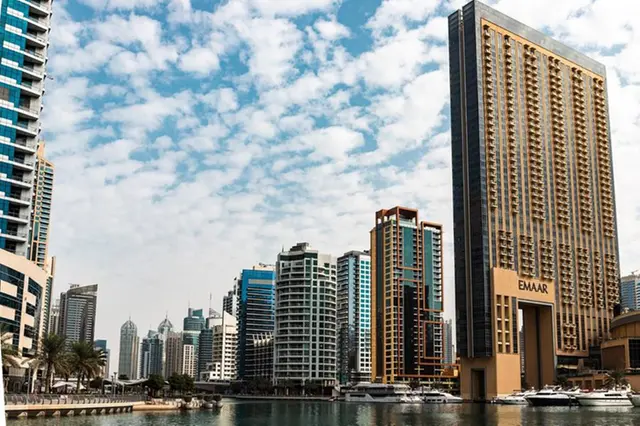Do you have credits to refresh my ad? This was a constant question by agents in the early days of digital advertising in Dubai. But I digress, let’s rewind to 2006, the dawn of the real estate industry in Dubai, when the first 6 towers were launched in Dubai Marina and the world got a taste of what is to come. Or let’s rewind a little further to 1966 so we can add some colour and context to this article.
Everyone knows the history of Dubai. A humble trading port before the discovery of oil with the chief export being pearl diving and fishing, where the Indian rupee was used as we did not have an established currency yet.
Soon after Conoco, an international oil company, discovered oil in Dubai in 1966, Sheikh Rashid Bin Saeed Al Maktoum, the father of Dubai along with Sheikh Zayed Bin Sultan Al Nahyan developed Port Rashid, the Dubai Creek dredging and expansion and the Dubai International Airport, the underlying theme being connectivity to the wider region. Jebel Ali Port became the 7th largest port in the world, Emirates became the most famous and largest airline on the planet and the terminal 3 now handles over 75 million passengers per year.
Fast forward to 2006, where the first glimpse of freehold real estate was revealed to the public. What did this mean for expats in the country, for UAE nationals and for the wider region as a whole?
Dubai is predominantly inhabited by expats, with over 88% calling this city home, many originating from the subcontinent. In those countries, the ground beneath your feet keeps shifting, with new laws affecting inheritance and taxation, while constant family disputes over ownership and succession foster endemic uncertainty. Owning an asset there often becomes precarious, as the very definition of stability is loosely applied. Dubai held the promise of stability, safety and most of all permanence, something that you could hold on to in a country governed by strict real estate laws.
The advent of freehold laws created a property market, which in turn fueled advertising. Gulf News and Khaleej Times were already established dailies in the city, with average circulations of about 92,000 and 70,000 copies, respectively. This formed the primary medium through which early real estate agents advertised their properties. Print ads, however, were costly, rigid, and quickly outdated as prices and terms changed overnight. As the internet’s influence grew in the region, a new platform emerged to meet these needs — Dubizzle.
Dubizzle was founded in 2005 in Dubai by J.C. Butler and Sim Whatley, two American expats who saw a gap in the market for an online classifieds platform. It began as a simple website for buying, selling, and renting the four verticals of classifieds; classifieds, jobs, cars and real estate and as such grew into the UAE’s leading digital marketplace. Property Finder came soon after and was founded in 2007 by Michael Lahyani in Dubai as a response to the fragmented property market. Starting as a print classifieds guide, it transitioned online, becoming a major digital property portal across the UAE and expanding into multiple MENA markets.
Bayut was launched soon after that in 2008 by the Haider brothers in Pakistan as Zameen before relocating its headquarters to Dubai. Focused on comprehensive online property listings, Bayut grew rapidly with strong tech investment, becoming one of the UAE’s dominant real estate portals under the Emerging Markets Property Group (EMPG).
The credits to refresh ads were the mechanism through which Dubizzle placed your ad at the top of searches. This was archaic yet brilliant way for Dubizzle to make money and for agents to pay for something that apparently got them more exposure on this platform. PF and Bayut followed suit by charging extra for signature and hot listings on their respective platforms. This however did not scratch the itch the market had in 2022.
As Dubai was leering out of the fever dream that was Covid-19 in 2022, real estate investments and particularly off plan real estate exploded with $144 Billion capital invested, up from $82 Billion the year before, a 75% increase in a year. Dubai’s resilience through the pandemic and strong medical and legal frameworks gave people solid ground to walk on, where tectonic plates were shifting both in the global South and North. PF and Bayut saw their subscriptions skyrocket by 60% in one year.
Fast forward to 2025, where July saw a record $17.3 Billion worth of real estate sold and $570 million worth of transaction per day – for a city of just over 4 million people, these are some impressive numbers. These deals however were not always found on the portals.
Meta (Facebook and Instagram) and TikTok became huge drivers of eyeballs to off plan real estate from 2022 onward. With Meta Business Suite, TikTok Ads Manager and Google Ads, agencies became wise to the fact that they can control their own narrative. They started building websites using framer and wix, creating engaging content on Instagram with a gimbal, an iPhone and free editing software and boosting their ads to reach customers in Europe and Asia. These platforms gave agents a voice, where generic listing sites are limited to images and text, video platforms opened up a whole new market of creative content for agents and their customers. UAE has 7.6m instagram users and TikTok 11.3m, both groups spending an average of 2 hours per day on these platforms. Nowadays, almost every agency is spending an equivalent amount of listing platforms as they are on social media.
With the Dubizzle Group getting ready to IPO in October 2025 and PF having raised $525 million from Permira and Blackstone, who are serious international investors, it remains to be seen if these platforms will catch up to the rising tidal wave of Meta and TikTok advertising their lunch, and eating it too.

